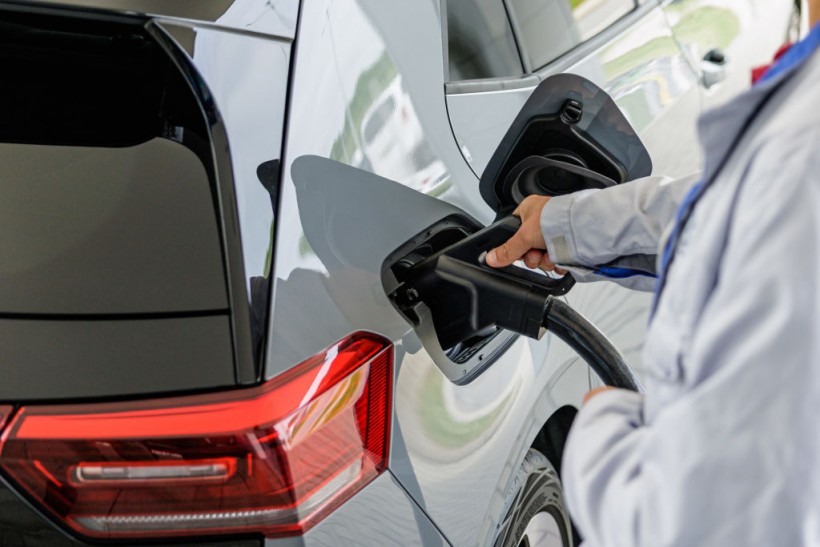Iowa will adopt the "Electric Fuel Excise Tax" on July 1, making EVs in the state pay fuel taxes in two different ways. Not only do EVs have to pay twice, but each of these taxes is higher than the tax for an equivalent gas vehicle.

(Photo : Jens Schlueter/Getty Images)
ZWICKAU, GERMANY - MAY 24: A worker demonstrates the charging process of Volkswagen's second generation ID.3 electric car on May 24, 2023 in Zwickau, Germany.
EV Double Taxes
An additional 'Electric Fuel Excise Tax" will be adopted by Iowa this coming July 1. According to a report from Electrek, this will apply a $.026 tax per kilowatt-hour of electricity dispended into a battery of an electric vehicle. This will be on top of an annual supplemental EV registration fee of $130, explicitly intended to replace gas taxes for EVs.
The new tax will fortunately not apply to residences but only to those who charge at a public or commercial station. EV owners will now have to pay two taxes whereas a gas car driver only pays one when they go to a gas station. In addition to this, each of these taxes is higher than the tax for an equivalent gas car.
While an EV is taxed at about the average of 35mpg car and with Iowas's average 15k miles driven per year, this will be far less than the average efficiency of an EV, rated at over 100 mpg despite the 35mpg being more than the average gas vehicle. By only looking at Electric Fuel Excise Tax, this is already more than what an EV would pay if it used gas.
However, the 2.6c/kWh is also more than the taxes on gasoline usage as the state tax of 30c/gal represents a tax of about 8% for an average Iowa gas prices of $3.70/gal. Meanwhile, 2.6 vets is an 18% tax for average Iowa electricity prices of 14c/kWh. This is more than double the percentage tax on gas.
Also Read: Vermont Lawmakers Considers Mileage-Based Tax Credits on Electric Vehicles
Passing the Additional Tax
This effort from Iowa comes as electric vehicles are expected to be the new normal in the coming years. President Joe Biden aims for half of the United States vehicle sales to be electric by 2030. By implementing this tax, The Iowa Department of Transporation believes that this will help offset the decline of fuel tax revenue as the EV market grows
Aside from Iowa, several states have implemented excessive fees for electric vehicles to make up for shortfalls in road budgets as the local government believes that EVs are somehow skipping out on their fair share. But the government of Iowa justified that these taxes have nothing to do with road damage.
Currently, Iowa contained 4,596,501 gas vehicles and 9,400 EVs registered in 2022. As EVs will pay the same amount as the average Iowa driver, they will garner about $1.1 million in EV fuel excise tax per year collectively.
Axios reported that these funds will are not going to help solve road funding, especially since the government will make up such a small amount of cars. As per Consumer Reports Chris Harto, states will have to find other ways to fund their roads, especially since cars are becoming more fuel efficient.
Related Article: IRS Lists Only 6 Electric Vehicles to Still Qualify for Full $7,500 Federal Tax Credit









